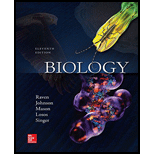
Biology
11th Edition
ISBN: 9781259188138
Author: Peter H Raven, George B Johnson Professor, Kenneth A. Mason Dr. Ph.D., Jonathan Losos Dr., Susan Singer
Publisher: McGraw-Hill Education
expand_more
expand_more
format_list_bulleted
Concept explainers
Textbook Question
Chapter 36, Problem 3A
If you were to relocate the pericycle of a plant root to the epidermal layer, how would it affect root growth?
a. Secondary growth in the mature region of the root would not occur.
b. The root apical meristem would produce vascular tissue in place of dermal tissue.
c. Nothing would change because the pericycle is normally located near the epidermal layer of the root.
d. Lateral roots would grow from the outer region of the root and fail to connect with the vascular tissue.
Expert Solution & Answer
Want to see the full answer?
Check out a sample textbook solution
Students have asked these similar questions
PCBs and River Otters: Otters in Washington State’s Green-Duwamish River have high levels of polychlorinated biphenyls (PCBs) in their livers. PCBs can bind to the estrogen receptors in animals and disrupt the endocrine system of these otters. The PCBs seem to increase the estrogen to androgen ratio, skewing the ratio toward too much estrogen.
How would increased estrogen affect the river otter population?
Based on your reading of the materials in this unit, what factors can affect fertility in humans?
Explain how each of the factors affecting human fertility that you described can disrupt the human endocrine system to affect reproduction.
Other than oil and alcohol, are there other liquids you could compare to water (that are liquid at room temperature)?
How is water unique compared to these other liquids?
What follow-up experiment would you like to do, and how would you relate it to your life?
Selection of Traits
What adaptations do scavengers have for locating and feeding on prey?
What adaptations do predators have for capturing and consuming prey?
Chapter 36 Solutions
Biology
Ch. 36 - Which cells lack living protoplasts at maturity?...Ch. 36 - Prob. 2UCh. 36 - Prob. 3UCh. 36 - Prob. 4UCh. 36 - Prob. 5UCh. 36 - Prob. 6UCh. 36 - The function of guard cells is to a. allow carbon...Ch. 36 - Palisade and spongy parenchyma are typically found...Ch. 36 - Prob. 9UCh. 36 - Prob. 10U
Ch. 36 - Prob. 11UCh. 36 - Prob. 2ACh. 36 - If you were to relocate the pericycle of a plant...Ch. 36 - Prob. 4ACh. 36 - Prob. 5ACh. 36 - Prob. 6ACh. 36 - Prob. 7ACh. 36 - Prob. 8ACh. 36 - Which is the correct sequence of cell types...Ch. 36 - Prob. 10ACh. 36 - Prob. 1SCh. 36 - Prob. 2SCh. 36 - Prob. 3SCh. 36 - Prob. 4SCh. 36 - Increasing human population on the planet is...
Knowledge Booster
Learn more about
Need a deep-dive on the concept behind this application? Look no further. Learn more about this topic, biology and related others by exploring similar questions and additional content below.Similar questions
- Competition Between Species What natural processes limit populations from growing too large? What are some resources organisms can compete over in their natural habitat?arrow_forwardSpecies Interactions Explain how predators, prey and scavengers interact. Explain whether predators and scavengers are necessary or beneficial for an ecosystem.arrow_forwardmagine that you are conducting research on fruit type and seed dispersal. You submitted a paper to a peer-reviewed journal that addresses the factors that impact fruit type and seed dispersal mechanisms in plants of Central America. The editor of the journal communicates that your paper may be published if you make ‘minor revisions’ to the document. Describe two characteristics that you would expect in seeds that are dispersed by the wind. Contrast this with what you would expect for seeds that are gathered, buried or eaten by animals, and explain why they are different. (Editor’s note: Providing this information in your discussion will help readers to consider the significance of the research).arrow_forward
- What are intrinsically disordered proteins, and how might they be useful for a living system?arrow_forwardWhat are Amyloid Fibrils? What biological functions are these known to perform?arrow_forwardHow do histamine and prostaglandins help in the mobilization of leukocytes to an injury site? What are chemotactic factors? How do they affect inflammation process?arrow_forward
- Compare and contrast neutrophils and macrophages. Describe two ways they are different and two ways they are similar.arrow_forwardDescribe the effects of three cytokines (not involved in the initial inflammation response). What cells release them?arrow_forwardDescribe activation of helper T cells or cytotoxic T cellsarrow_forward
arrow_back_ios
SEE MORE QUESTIONS
arrow_forward_ios
Recommended textbooks for you

 Biology (MindTap Course List)BiologyISBN:9781337392938Author:Eldra Solomon, Charles Martin, Diana W. Martin, Linda R. BergPublisher:Cengage Learning
Biology (MindTap Course List)BiologyISBN:9781337392938Author:Eldra Solomon, Charles Martin, Diana W. Martin, Linda R. BergPublisher:Cengage Learning


Biology (MindTap Course List)
Biology
ISBN:9781337392938
Author:Eldra Solomon, Charles Martin, Diana W. Martin, Linda R. Berg
Publisher:Cengage Learning
Dissection Basics | Types and Tools; Author: BlueLink: University of Michigan Anatomy;https://www.youtube.com/watch?v=-_B17pTmzto;License: Standard youtube license